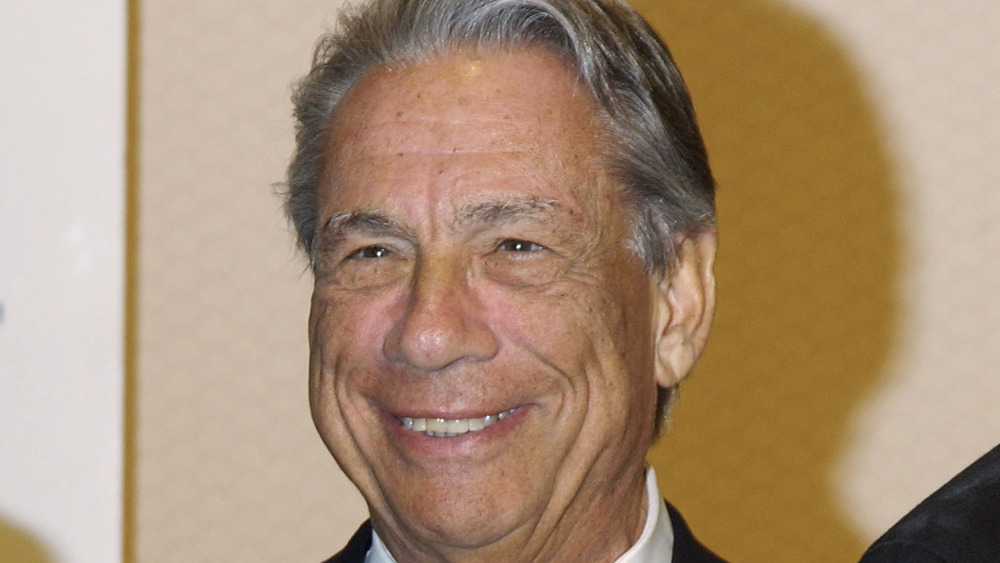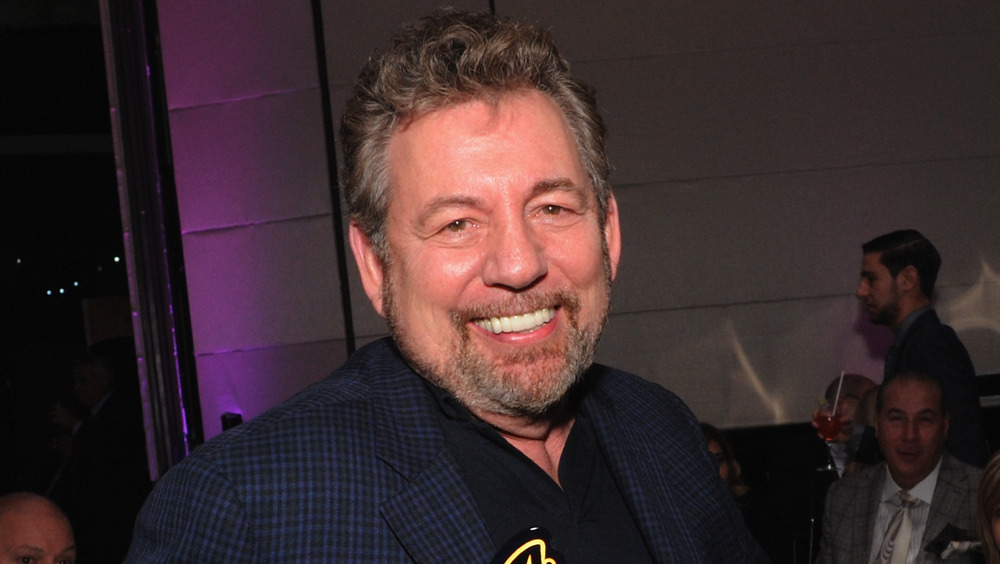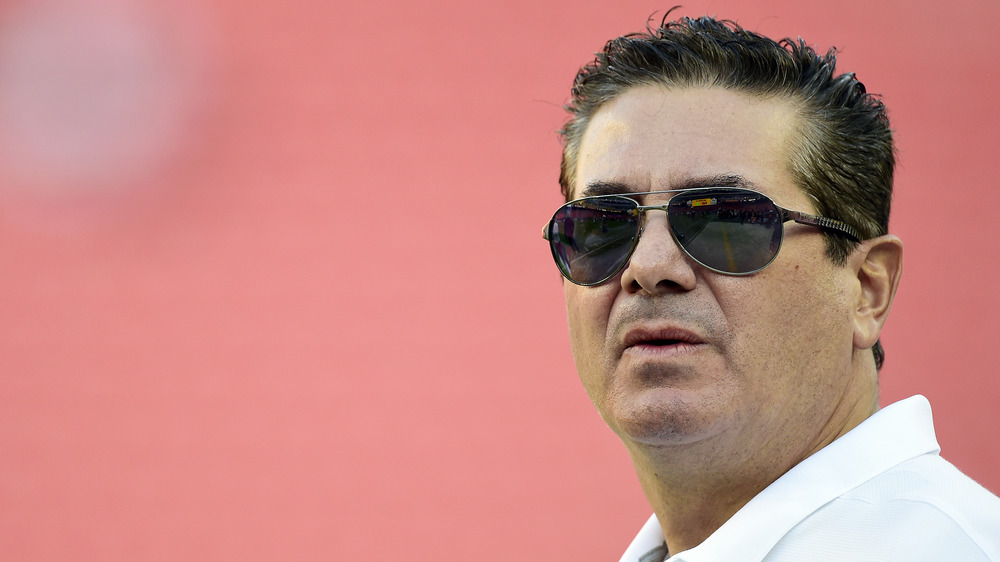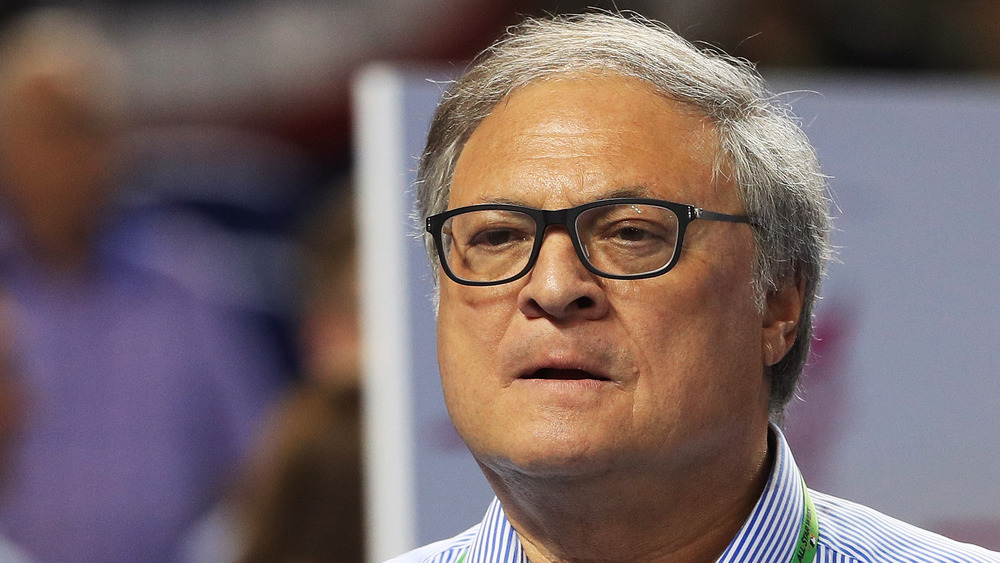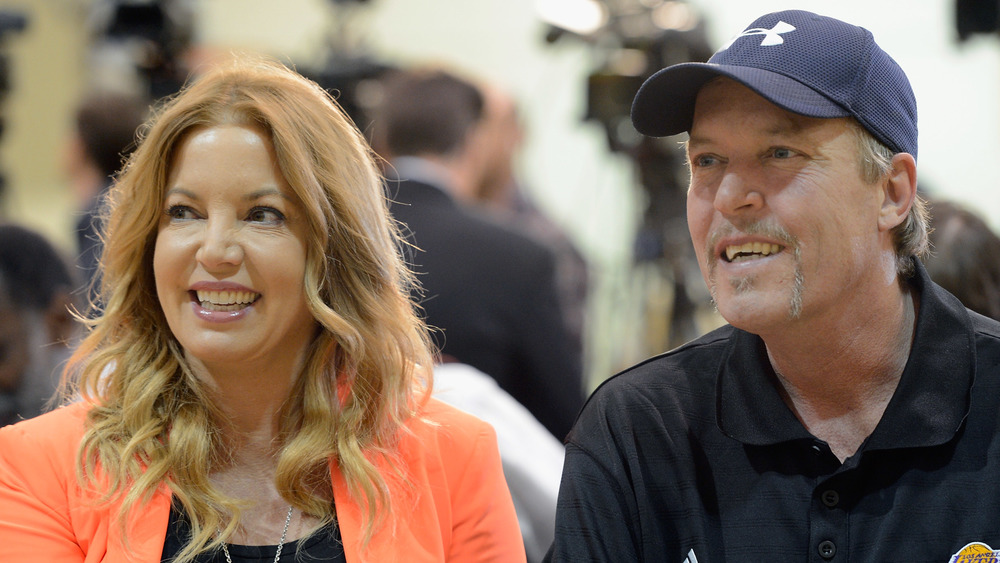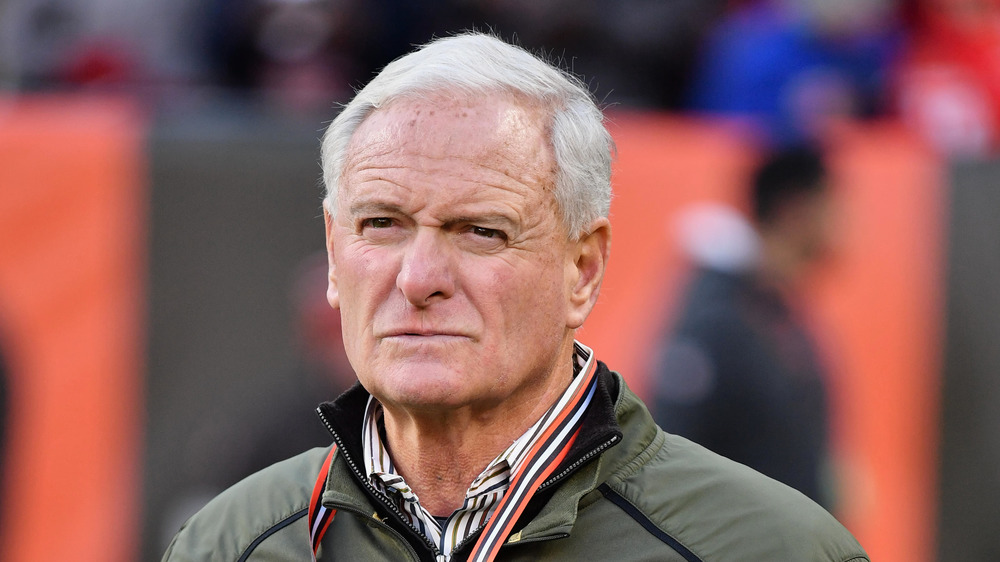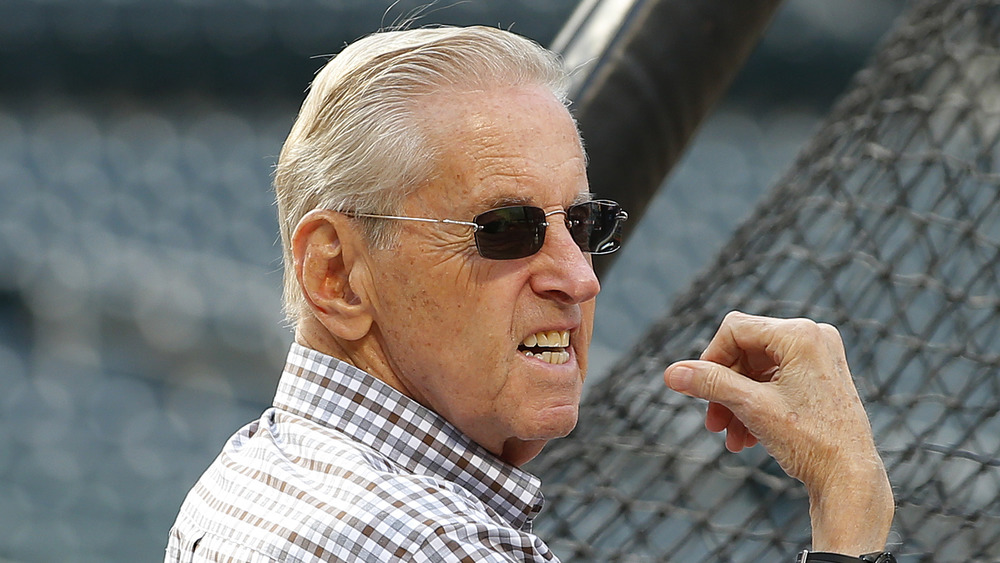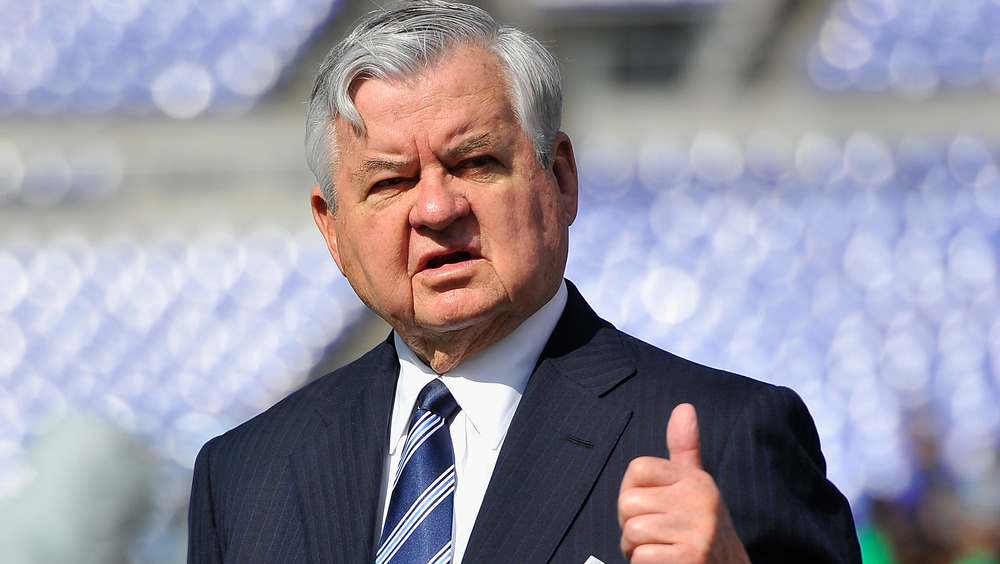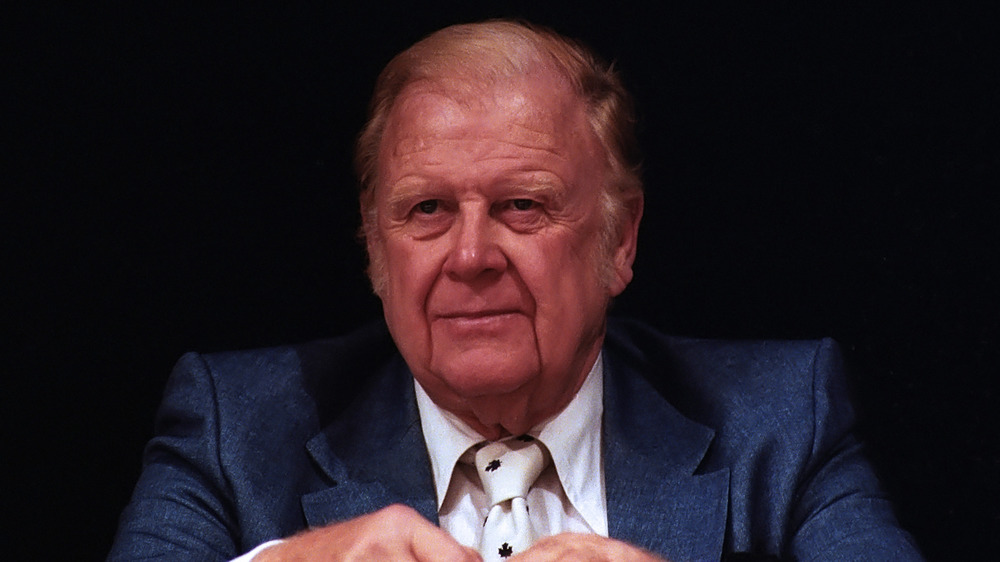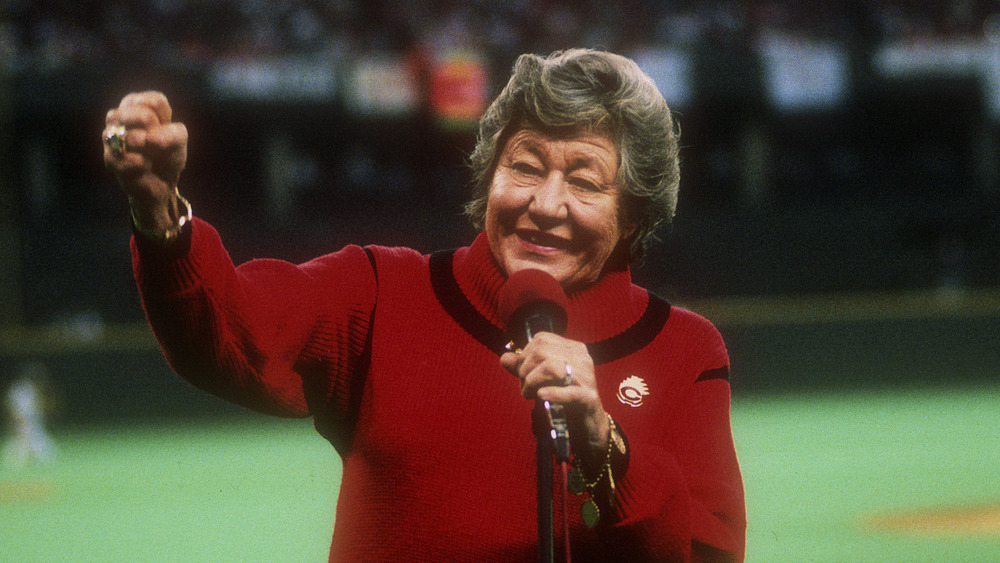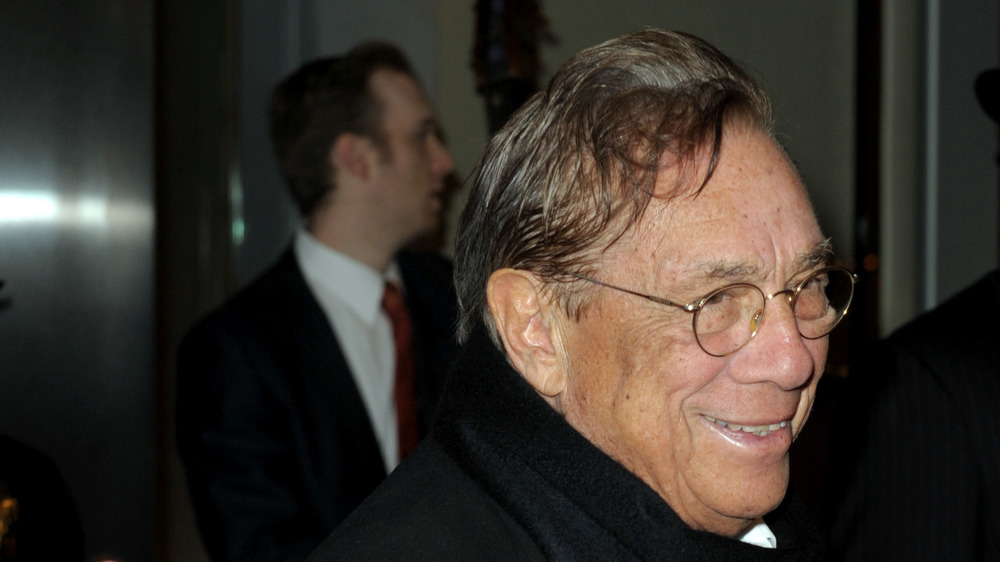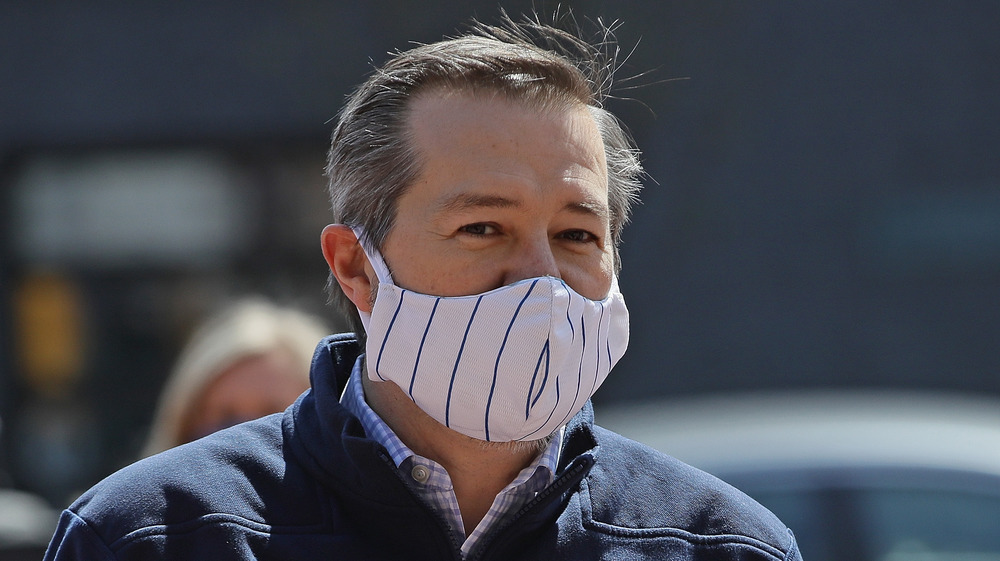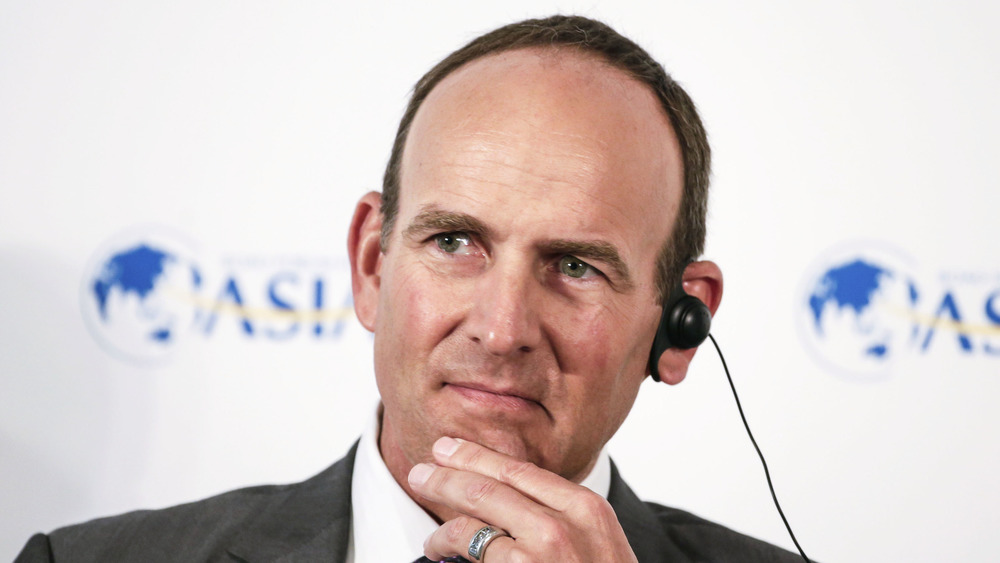The Shadiest Sports Team Owners
Sports franchises like the Los Angeles Lakers, the New York Yankees, and the New England Patriots become celebrated teams with success over and over again. And while the players obviously contribute to the winning formula, the ownership also plays a huge role in how the team can continue to win. And for people with a lot of money, it's possible to buy a franchise and try to turn it into a longtime winning team. But things don't always go as planned. In the '80s, Donald Trump was the owner of the New Jersey Generals. This football team was a part of the United States Football League, or the USFL. And according to Stadium Talk, Trump's "plan all along was to leverage USFL ownership into NFL ownership." Instead, his actions in the league "almost single-handedly sank the USFL."
Similar to Trump, the sports world has been full of owners with questionable actions. Whether it's racist remarks or terrible personnel decisions, these owners can ruin a franchise's reputation. Perhaps even worse, fans worry that owners are only in the position to make a profit. As Deadspin revealed through financial documents, the common trend of many professional sports teams, "whether they're winners or losers" on the field, is "to make their owners a fat pile of money."
Is there an owner that you absolutely despise? Get ready to play ball as we take a look at the shadiest sports team owners.
James Dolan can't say nice things
In one of the biggest in the world, New York City, the most visible NBA team is the New York Knicks. It helps, after all, that the team plays within the famous Madison Square Garden in central Manhattan. But despite the big fanbase, the franchise has been in trouble for many years. And owner James Dolan has certainly played a part in the losing formula. "During the championship years (1967-1975), the Knicks became an NBA darling that was known for good ownership and front office stability and during the Dolan years," starting in 1999, "the Knicks became an NBA bottom feeder with little hope of success," per Bleacher Report.
Dolan's handling of serious off-court matters angered the former NBA commissioner David Stern. Back in 2007, Anucha Browne Sanders, who was once an executive for the Knicks, filed a harassment lawsuit against the franchise and mainly, head coach Isiah Thomas. Sanders won the case for $11.6 million. After the incident, Stern told ESPN what he thought about the scenario. "It demonstrates that they're not a model of intelligent management," he said. Years later, while leaving a Knicks game, a fan shouted at Dolan that the owner should sell his team to someone better. As reported by TMZ, Dolan called the fan "rude" and called security over.
Daniel Snyder won't let history go
"For more than two decades, Washington Redskins owner Daniel Snyder has fiercely resisted calls to change the name of his team, despite protests that the name is offensive to Native Americans," The Washington Post reported in 2020. Prior to the start of the 2020-2021, Snyder and his franchise officially changed into the more generic and appropriate name, the Washington Football Team (via the team's website). Throughout the years, Snyder gave excuses or other reasons why the name shouldn't be changed, despite the obvious offense.
For example, in 2013, Snyder faced continuous pressure to change the name. President Obama said Snyder should consider changing the name. But the owner wouldn't budge. He even wrote a letter to fans that said he must respect and celebrate the history of the franchise, per The Washington Post. After Snyder's comments, The Washington Post explored the origins of the William Henry "Lone Star" Dietz, the man and inspiration for the original team name. Dietz was the first head coach of the team, first based out of Boston. But allegedly, the coach "was a German American from Wisconsin who wanted to play football as an Indian to cash in on the fame." And even more, "Dietz also served jail time for dodging the draft during World War I because he falsely registered as an Indian."
Jeffrey Loria seemed in it for the money
In 2002, Jeffrey Loria became the proud owner of the Florida Marlins. And just one year later, his franchise pulled off an improbable season as World Series champions. But this wouldn't be a perfect match between owner and franchise for the years following the victory. Loria facilitated a brand new stadium to be built for the team. Only, his financing practices caught the eye of the SEC. As reported by The Wall Street Journal, the investigation involved whether the franchise actually "needed public help because it could not afford to pay for a new ballpark." So, it didn't look great when Loria celebrated the finished stadium with a cake replica of the new structure, featuring the team's logo made out of "more than 3,600 Swarovski crystals" (via Strip Club with Stanton).
But in 2012, Loria's moves shocked the entire baseball world, trading away 12 Marlins all in one deal. The owner claimed the move was to start fresh after the team finished in last place. But some fans felt Loria wanted to make more money prior to selling the team, "looking for [a] profit," according to The Miami Herald. Loria ultimately turned his $158 million purchase of the Marlins into a $1.2 billion sale, according to Sun-Sentinel.
Jim Buss didn't stand a chance in the big leagues
Jerry Buss, a doctor and businessman, purchased his dream team, the Los Angeles Lakers, in 1979. And he used his love of the franchise to help turn it into one of the most successful teams in NBA history. The NBA called him the "Greatest Owner in Sports," for the Lakers' success under Buss' watch. And on a personal level, the owner reportedly "inspired fondness and loyalty amongst his family, players, employees and fans." This meant his son, Jim Buss, had big shoes to fill when taking over as "executive vice president of basketball operations for the Lakers," as revealed by the Los Angeles Times. According to USA Today, with Jim marching the franchise into disarray, his sister, Jeanie Buss, fired him in 2017, "and placed Magic Johnson in charge of basketball operations for the Lakers.
Jeanie revealed on the Daddy Issues with Joe Buck and Oliver Hudson podcast why she canned Jim. "When my brother wasn't going with the way my dad did things, it was a little bit distressing for me," she said. Jeanie claimed it was difficult to see where her brother "was trying to go and what our identity was going to be as a team."
Jimmy Haslam's sketchy side schemes
Randy Lerner, the previous owner of the Cleveland Browns, found a prospective buyer in 2012. He sold the franchise to "Jimmy Haslam for in excess of $1 billion," according to a tweet by ESPN insider Adam Schefter. Haslam could afford to buy the team, in part because of his successful company outside of football. According to Forbes, Haslam, a billionaire, took over his father's gas business. He is the "president and chief executive of the Pilot Flying J truck stop company," Cleveland.com reported. The company supplies "fuel to drilling rigs," including some controversial practices, like acquiring the top "supplier to the drilling and fracking operations in the country." And in addition to buying the football team, the owner hoped "to cash in on the state's shale gas." But these activities off the field involved some awful practices.
A few years after purchasing the team, Haslam's company paid out a huge settlement. As reported by ESPN, "Haslam has agreed to pay a $92 million penalty for cheating customers out of promised rebates and discounts." According to the article, this huge agreement may have been so Haslam could avoid jail time. "Pilot would not agree to pay unless they felt the government would not prosecute" Haslam, claimed David Raybin, a criminal defense attorney.
Fred Wilpon picked the wrong business partner
Any association with a Ponzi scheme is sure to create instant mistrust with a businessman. This happened with the New York Mets, and not just any Ponzi scheme but the Ponzi scheme. The New York Mets' owner Fred Wilpon, was business partners with the famous convicted schemer Bernie Madoff. Per ABC News, Madoff's trickery saw Wilpon invest "half a billion dollars with him," allegedly "[ignoring] clear warning signs." As a result, Wilpon and part-owner Saul Katz " reached a settlement, "[paying] back $162 million in so-called fictitious profits they had reaped from the net winner accounts from 2002 to '08," as revealed by The New York Times. Though the lawsuit "initially sought $1 billion," the amount was ultimately much lower because both Katz and Wilpon claimed they were victims, acting "in good faith."
This incident became part of a long line of damaging deals constructed during Wilpon's time as the owner. And often to seemingly make him more money. As Rolling Stone recapped, these practices of "repeatedly structured deferred payments into player contracts" helped grow Wilpon's profits. At the losing ends were the fans who, more than anything, want their team to bring home a World Series title. Instead, with Wilpon at the top of the organization, fans saw "a series of secret and semi-secret loans" and "willfully opaque bookkeeping," per SB Nation.
Jerry Richardson was no southern gentleman
In December of 2017, Sports Illustrated published a shocking report about Jerry Richardson, the owner of the Carolina Panthers. The report detailed multiple instances of alleged "workplace misconduct" by Richardson. This included "sexual harassment against female employees" and "a racial slur at an African American employee."
After the investigation, the NFL commissioner Roger Goodell fined Richardson $2.75 million for his role in the "workplace misconduct," the NFL announced. The Panthers organization announced it would investigate the owner as well. But two days after this announcement, Richardson put the team up for sale, as reported by The New York Times. And because owning an NFL football team is a rare opportunity, the team sold for a "record-setting amount of at least $2.2 billion" to billionaire David Tepper, per The New York Times.
In addition to this creepy behavior prior to leaving, Richardson also pushed for limiting salaries of players and referees in the NFL. All while he took home "millions in profit" himself, according to Rolling Stone. And the former owner reportedly once snapped back at Peyton Manning, one of the greatest quarterbacks in the history of the NFL and a Hall of Famer. Rolling Stone claimed Richardson responded to "Manning's concerns about concussions" by asking, "What do you know about player safety?"
Harold Ballard's history before the Hall of Fame
Starting out within the Toronto Maple Leafs organization, Harold Ballard worked his way from a coach all the way to the majority owner of the organization. Part of the reason his success worked so well was "his extroverted and aggressive personality," as recapped by the Hockey Hall of Fame. And during his spot on top as the owner, Ballard "often spoke his mind and earned his share of critics and fans for doing so." He was also a controversial owner outside of his divisive personality. In 1972, Ballard was convicted on "charges of theft and fraud," as reported by CBC. According to the story, the hockey executive used funds from the Maple Leaf Gardens Ltd. — the name of the organization then — "to remodel his home." His sentence was nine years in prison but only served one year until his release.
When he was out, Ballard boasted that "prison was like staying in a motel, with color television, golf, and steak dinners." Once back in the organization a free man, Ballard continued to find ways to be a "bully" and "tyrant." A few years later, the owner fired the team's head coach. And while personnel changes happen all the time, things were awkward when Ballard couldn't find a suitable replacement. So, the owner rehired the coach and reportedly "told him to wear a bag over his head."
Marge Schott revealed her terrible opinions
Marge Schott was in rare company as a female owner of a major sports team, the Cincinnati Reds. But she made headlines in the early '90s for her crass and inappropriate comments. In 1993, Schott was suspended from the league and fined $25,000 "for slurs against blacks, Jews and Asians," the Los Angeles Times reported. And one year earlier, the owner publicly talked about Adolf Hitler and told The New York Times that the German dictator "was good at the beginning, but he just went too far." As if the backlash from these comments, followed by an actual suspension wasn't enough to teach Schott, she continued sharing her unpopular thoughts years later.
In a 1996 interview with ESPN, she once again praised Hitler and said he should be acknowledged for "building 'tremendous highways' and getting 'all the factories going.'" (via The New York Times). And after her statements, Schott reportedly had no intention to apologize but a high-up MLB executive "emphatically made it clear that she had to do it."
For her interview comments, "Schott was forced to give up day-to-day control of the Reds until 1998," per NPR. One year later, Schott sold the team. According to The New York Times, the owner was forced by the MLB "to sell her controlling interest in the Reds" and finally put an end to her "inflammatory remarks."
Donald Sterling got caught on tape
In basketball, Donald Sterling, who owned the Los Angeles Clippers, found himself in the center of controversy. Unsurprisingly, given in a town filled with gossip leads, TMZ reported proof of Sterling saying racist remarks. In the past, Sterling had "been sued twice by the federal government for allegedly refusing to rent apartments to Blacks and Latinos." And he was previously acquitted in a lawsuit for racial discrimination against one of his former executives. But the audio clip obtained by TMZ showed definitive proof of Sterling's nature.
Among the worst parts of the audio, Sterling told his girlfriend to stop "bringing black people to his games ... including Magic Johnson." As a result, the NBA commissioner Adam Silver swiftly acted to ban Sterling for life from the basketball league. Silver fined the former owner the maximum amount he legally could — $2.5 million — and forced the sale of the Clippers, The Washington Post reported. Sadly, Sterling still earned a nice paycheck from the incident. The owner purchased the basketball team "in 1981 for $12.5 million" and at the time of the forced sale, the franchise was worth an estimated $1 billion.
The Ricketts family's poor political moves
According to Forbes, the Ricketts family is one of the wealthiest families in America. The combined net worth in 2015 was $4.5 billion. In 2009, the family purchased the Cubs for $900 million. And once in the driver's seat, the family found themselves mixed in several public blunders — especially political associations. According to Rolling Stone, the Ricketts funded an attack ad against Jeremiah Wright in the 2012 election. The ad featured "a casting call for a 'Metrosexual Black Abe Lincoln'" but luckily never aired.
In 2020, one of the Ricketts, Pete, who is also the governor of Nebraska, stirred up anger during a meeting. NBC reported that Pete allegedly said "you people" when referring to "a group of Black civic and religious leaders." And among the other controversial decisions by the family was its involvement with perhaps the most controversial president, Donald Trump. As reported by the Chicago Tribune, Todd Ricketts — the "co-owner/board member" of the Cubs — served "as the fundraising chairman for Trump's reelection campaign."
The DeVos Family tried to secretly fund a controversial group
The city of Orlando, Fla. is known for all sorts of magic. Obviously, Disney. But also, the NBA team the Orlando Magic. And the DeVos family was caught in a scandal for its charitable donations. Billionaire Richard DeVos bought the franchise in 1991. During his tenure, the Magic "won five division titles, had seven seasons of 50-plus wins and made the NBA Finals in 1995 and 2009," as explained by the NBA. But his son, Doug, who ran his father's company Amway and partly owned the Magic, didn't have such a pristine record.
ABC reported that Doug provided $500,000 to "an anti-gay marriage group that was one of the leading advocates against same-sex marriage initiatives in eight states." This led to a boycott of Amway but the DeVos family issued no apology. Instead, a spokesperson for the company released a statement that claimed the owners "believe the highest calling of any individual is to express their own personal beliefs," MLive reported.
Dan Borislow helped ruin an entire league
Sadly, a push to popularize women's professional soccer in the US didn't stick around. The Women's Professional Soccer League (WPS) featured many of the stars of the US Women's national soccer team, like Hope Solo, but the league officially shuttered in 2012. And one of the biggest reasons for the end of the league was due to one of its owners, Dan Borislow. The millionaire owned the Boca Raton magicJack team but the WPS voted to dissolve the franchise, per Sun-Sentinel. It turned out, Borislow was responsible for many awful and questionable decisions during his time as owner, including statements that were "inappropriate, and either included offensive disparaging language or were detrimental to the league, the players and other teams."
He also may have been the only person ever to fire a perfect head coach — after the team started 3-0. The owner badmouthed the league too, calling the group "a royal pain in the a**," and calling sponsors "mobsters" (via Deadspin). Borislow went down swinging and brought on a lawsuit against his termination. But the legal fees were too high for even a professional sports league. The lawsuit ended and the league officially closed.

